"Banderas, get out of Odesa!" the crowd that gathered at the main entrance to the Kulikovo Pole square chanted hysterically.
The square where the burnt Trade Unions building is located was surrounded since 7 am by considerable numbers of police officers. A striped tape was stretched between the trees, preventing entrance to the park, where dog handlers walked around with their sheepdogs. There were reports that the square had been mined. It is hard to say whether this was true. In the recent weeks, anonymous sappers "planted explosives" here and there with enviable regularity. However, the pro-Russian activists were not credulous enough to believe this explanation, and openly stated this to the policemen from Zaporizhzhya who formed a human shield to block the way to the burnt building.
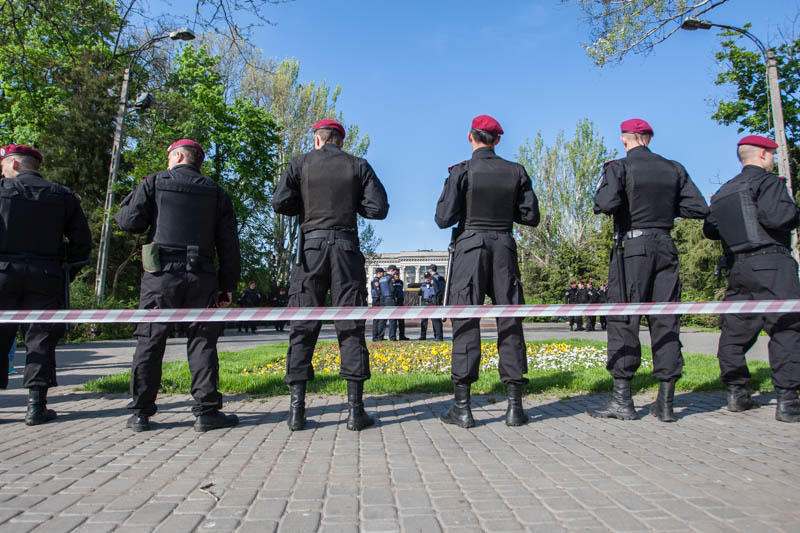

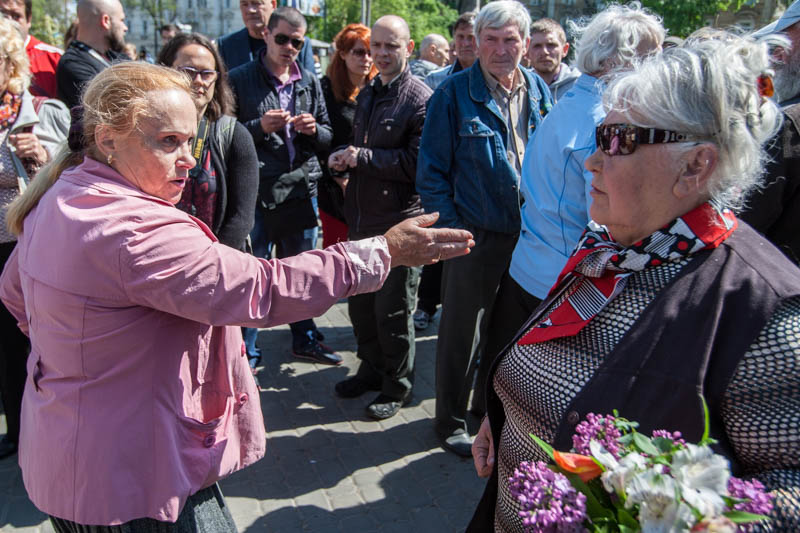
"Who could have mined it? This morning not even a mouse could slip by! They've been hanging out here for a long while. Do you really believe that someone could have planted the explosives?" asked the pensioners one another and the journalists around.
"We have no precise information on the mining. Our job is to simply stand by the metal detection arche. Only the management might have accurate information. But there really could have been a bomb scare call. It could have been done on purpose to delay the event," says a man in police uniform trying to calm down the angry babushkas.
Nearby, active pensioners are selling lilacs. The demand is high, the business is good, and elderly flower girls sell armfuls of flowers at a democratic price of 10 hryvnia a sheaf. Their cardboard boxes with the supplies of freshly cut branches empty out fast. People keep coming.
"Why are you standing here?! Let's storm them! To assault, everyone!" "Come ooooon!" a man in a dirty shirt of indefinite color, drunk since the morning, fights his way through the crowd. "I'll beat them cold! Just let me roll up my sleeves!" He tries to pull up his sleeves, but is not very successful. He pushes the policemen a bit and goes away, disappointed.
"Come on, Chuck Norris. Call your friends, too," say security officers, ironically and good-naturedly, as the man disappears behind dozens of heads.
Pensioners tried to break through the arche. A gray-haired grandfather swears that he is not afraid to die, provided that he can lay flowers at the Trade Unions building. The policemen are immovable. The pensioner tries to kneel, but then changes his mind and just takes his hat off. A man wearing a uniform appears next to him. He says that he's a deep-sea mariner and is not afraid of mines or bombs. He just wants to get to the square. Policemen come out to talk to the people, and in five minutes the crowd calms down a bit. They promise to let everyone in as soon as they are finished looking for the explosives. However, no one explained how the police planned to let more than a hundred people through one arche.
"Come on! I'll show you!" Another "assaulter" attempts to break through the crowd of people wearing crimson berets. Instead of using force, the policemen politely make way for a few seconds. This is enough for the "mourner" to find himself at the other side of the human chain, where he is gently taken by the arms by policemen.
"Look! Just look what these Banderas are doing! Why did you detain him?! Whom do you work for?!" the babushkas start yelling. The detainee, in the meantime, disappears behind the trees in the company of three police officers.
"In fact, a very serious screening operation is going on in the city, today also. The most "passionate" are being detained. Did we find something? Nothing serious, but enough to injure dozens of people," says a policeman, carefully looking around. "I think today everything will be quiet," he assures.
His words are confirmed by the pro-Ukrainian activists. They state that no representatives of Azov, Right Sector or Automaidan planned to appear at the Kulikovo Pole. They organized their own events.
The babushkas in the meantime lost patience and began laying flowers at the feet of the law enforcement officers. In ten minutes, the pile of flowers is considerable. The men in the uniform are embarrassed, but immovable. The spring sun is getting hotter, and some Kulikovo Pole activists go away to sit on the benches nearby, or just leave to pursue their activist lifestyle.
"I found the text! Let's sing our anthem!" proudly says a babushka wearing a kerchief, who holds a weather beaten piece of paper in her hands. Her friends congregate around her, and pensioners strike into a song with rattling voices: "Get up o proud Odesa, get up to the last battle with the fascist wicked power, with the cursed horde." Not all know the lines, only those closest to the holder of the piece of paper sing, while the others echo to the tune. The mixed chorus sings the refrain.
It is noon. More than 200 people stand in front of the police chain. Most are of the retirement age. However, young people can also be seen in the crowd, as well as some marginal characters who have already had a chance to wet their whistles. People lay bouquets on a flower bed nearby.
"A memorial! Let's make a memorial here," shout women in kerchiefs and start to lay out a sun shape in the middle of a lawn. They also try to lay out the words "We remember." They ask for advice on how to put flowers, because they can't see very well. But when they see the camera and hear the shutter sound, they escape shouting "Don't film!"
"I don't want to be a star of all your internets and youtubes! I just came to lay flowers! Leave me alone!" says a stout woman nervously.
"Where are you taking the flowers?! Put them back! Who told you to carry them? Where to? You are provocateurs! Put down the flowers and don't touch them! They will let us all in now and we'll remember the dead," says an angry pensioner to her colleague who tries to pick the bouquets from the feet of the security forces and take them to the lawn.
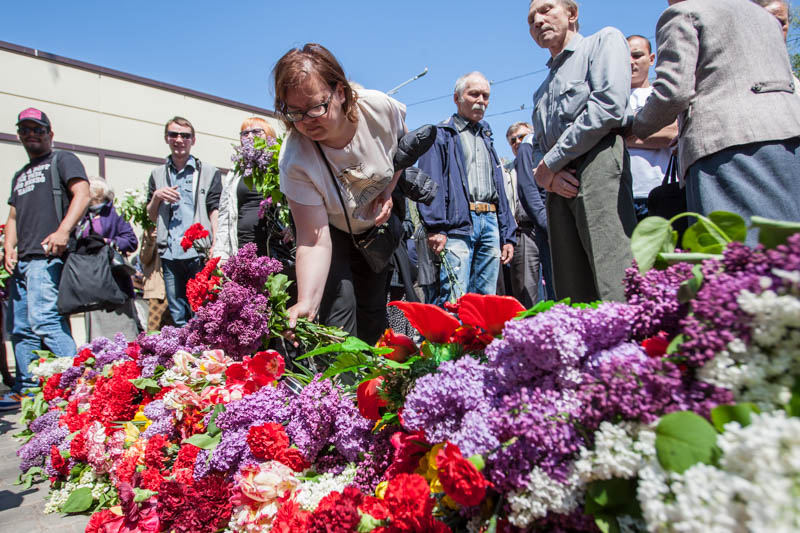
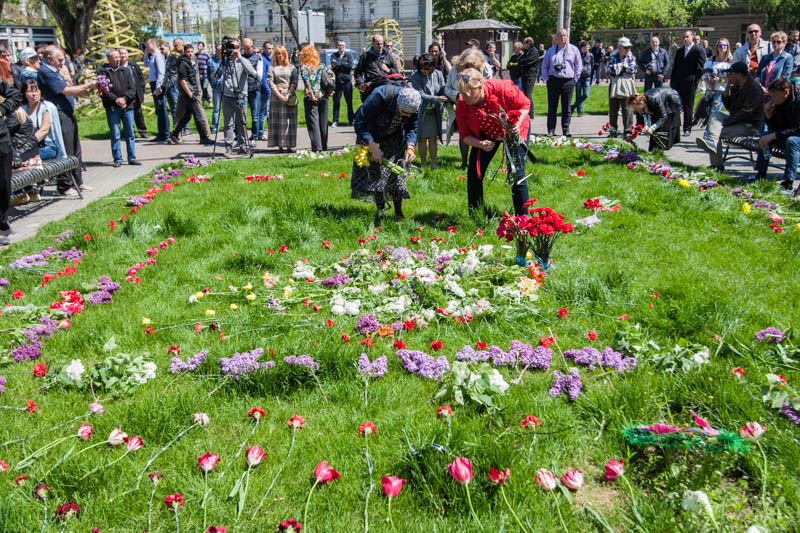


"But they will get orders to trample down the flowers! From whom? From Saakashvili!" says the babushka, grabbing a few bouquets and taking them to the "memorial."
"Christ has risen," says someone in the crowd. An improvised "sacred procession" arrives to the Kulikovo Pole. The Orthodox processionists hold a cross and a portrait of Nicholas II. They don't explain the connection between the latter and the victims of the fire two years ago.
"Christ has risen!!!" screams a man from the Orthodox ranks at the top of his lungs and sprays water around from a liter can. They walk around the square several times.
Meanwhile, an Opposition Bloc landing party touches ground at Odesa airport, with the shady MPs Yuriy Boyko and Vadym Novynsky who planned to organize a public prayer next to the burnt Trade Unions building. Their plan failed, however. The MPs were blocked at the exits from the airport by the activists of Automaidan, Right Sector and Azov. Police officers, including Giorgi Lortkipanidze, Acting Chairman of the National Police in Odesa region, arrived to talk the former members of the Party of Regions into going back to Kyiv.
"They are going to another terminal! Second floor! Quick!" Part of the activists blocks the exits from the airport. Police also arrive to make a corridor for passengers. Titushka-like men of the athletic nationality are also there, trying to negotiate with Automaidan, to no avail.
"Оuch! What are you doing? Help!" screams a teenager, theatrically falling on the pro-Ukrainian activists. His acting talent gathers around a small crowd. After a brief argument, the boy is released. A car drives up to the terminal, from which a priest wearing a robe emerges. It was decided to hold a prayer at the airport.
While the police was explaining to the Opposition Bloc representatives why their presence in the city is undesirable, the "official part" of the event began next to the Kulikovo Pole square. Black balloons and portraits of the victims appeared in the crowd. "Saakashvili, get out of Odesa!" chanted grandmothers excitedly. Someone shouted "Shame!" to the police.
"Christ is risen!" yelled a drunk man.
"He is risen indeed!" answered the crowd happy.
"Glory to Ukraine!" the man continued.
"Jackass!" answered the crowd aggressively.
The provocateur is taken out of the crowd by the police and given a lesson about slogans to use and not to use during mass rallies.
It is 6 p.m. The police are replaced by the National Guard. About 50 people are still on the square. The share of social outcasts is striking.
"Are they afraid of a bouquet? Let me go! I'll lay the flowers and come back! What is your problem? Come on, call your boss! Let me go!" another drunk activist waves withered flowers and yells. Someone calls again to storm the police chain, probably for the tenth time since morning. Only one man reacts. He heroically elbows his way through the metal detector and breaks through the first line of police. On the other side, he is politely taken by the arms and taken behind the trees along the familiar route.


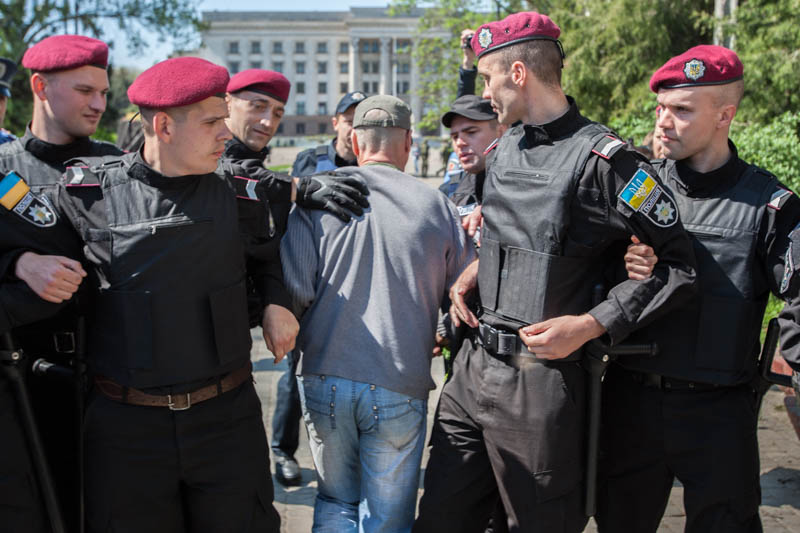
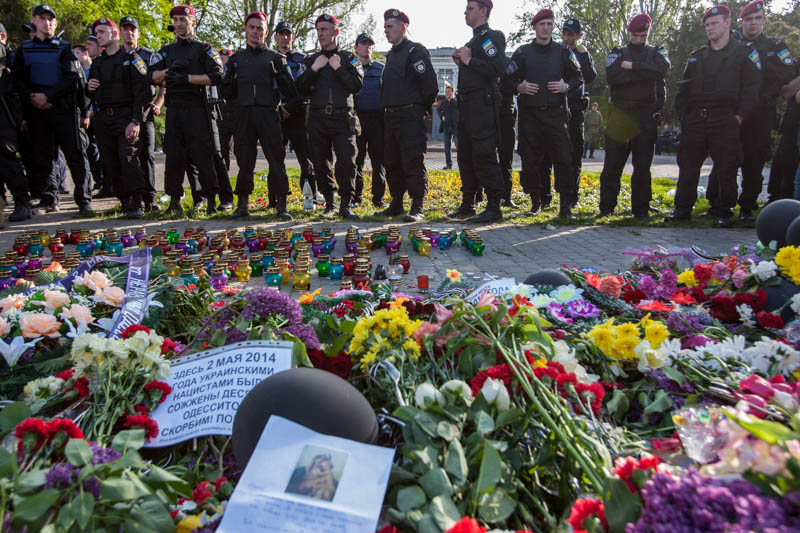
"Look what they're doing! They detained a man for nothing! Now I will go! I will pass with these flowers! You can't detain everyone! Who will be next?" The drunk with a bouquet is still in front of the arche. However, he is not very successful as a leader of popular discontent.
"Could you please… take a picture of our… Nat… National… National Guard?" asks an abdominous gentleman. His blue shirt is already dirty, and his breath stinks of vodka. He has trouble articulating.
"You took an ugly… ugly picture of the Nat… the guys in cammies. Our Nat… they have to look nice. Let me show you how," a Kulikovo Pole activist continues, waving his hands.
"You won't take a picture? You are all like this. You'll write that we are all separatists here and the like, huh? You'd better take a picture of the National Guard. They've been lying on the grass in the park the whole day not to let us in." The man is sad and disappointed.
While the event at Kulikovo Pole was getting near to its logical end, the event at the Hretska square was just beginning. It was there that two years ago pro-Ukrainian activists were killed. On the approaches to the square, passersby are carefully checked by the representatives of the volunteer battalions. A banner with the portraits of the victims is installed in the square, along with a small exhibition of the "souvenirs" from the ATO area: fragments of mines and shells, and car doors destroyed by them. Nearby is a stand with a war photos exhibition. The event started on time, at 8 p.m. About a hundred people came. Azov battalion representatives lined up with Ukrainian flags at the fountain next to Afina shopping center. Police chains let the ranks of volunteer battalion representatives to the square. They carried а Ukrainian flag a few meters long. Men in camouflage were handed carnations by their commanders.
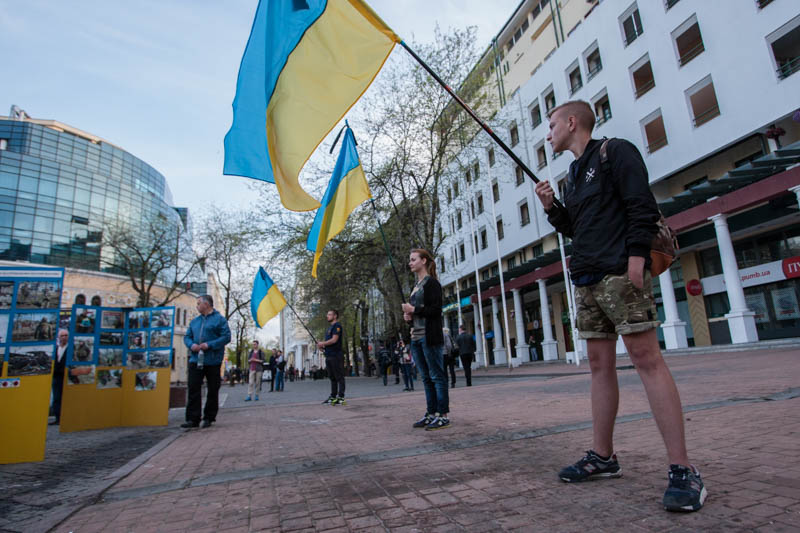

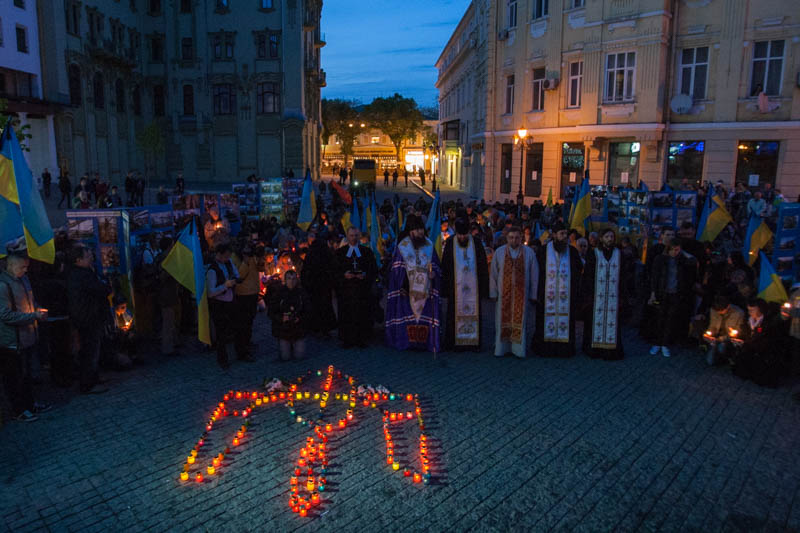
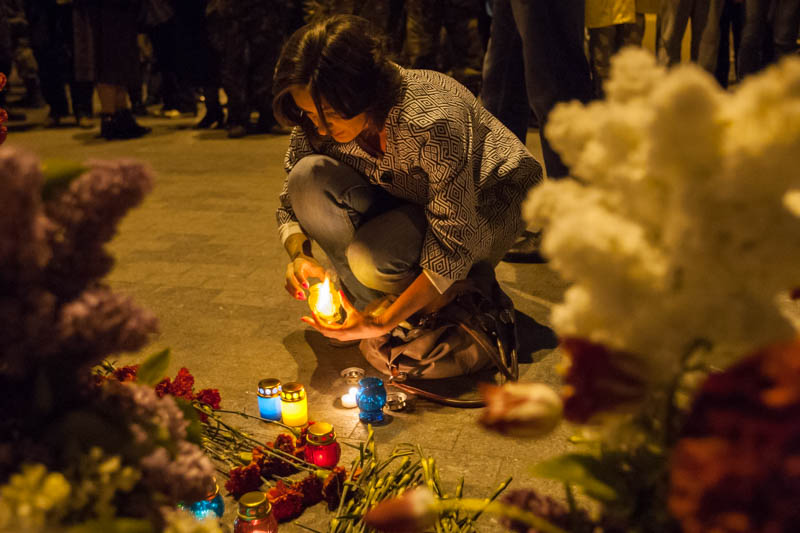

"On your knees!" sounds an order. The activists with the Ukrainian flag kneel down, a prayer sounds. In the center of the crowd, the Ukrainian emblem made of candles is lit. There are few speeches, and they are short. Those present quietly exchange a few words. Laughter is heard occasionally, when old friends meet. Flowers are laid to the portraits of the dead. In an hour, people begin to leave.
The corner of Preobrazhenska and Derybasivska streets is adorned with flowers. It was here that the first activist of Odesa Euromaidan Andriy Biryukov was killed. About 20 members of the Right Sector stand in a row in front of the portrait and bow their heads. People go past them, light candles, and lay bouquets. Men in camouflage stand in silence for a dozen minutes.
"To the dead heroes of 2 May: Glory, glory, glory!" twenty voices shout suddenly. Then the men line up and march along Preobrazhenska street to their base.
"Are we going to Kulikovo Pole? I don't think so, but you can ask our commander. Actually, we were going to the base," a Right Sector activist says in surprise.
The day was over, without clashes.

